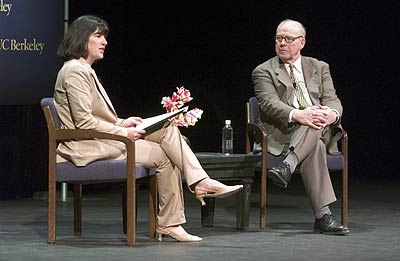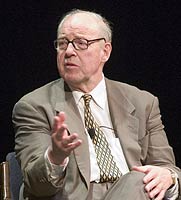
CNN Reporter Christiane Amanpour interviews former U.N. weapons inspector, Hans Blix
VIDEO: "Mass Destruction: Truth and Consequences with Hans Blix"
VIDEO: "Mass Destruction: Truth and Consequences with Hans Blix"
Alan: I followed Bush/Cheney's painstaking "titration" of the world's reaction to Hans Blix' fruitless search for WMD in Iraq, intermingled with Smirk and Snarl's political need to unleash The Iraq War before Americans started grumbling: "Hey! There are no weapons of mass destruction. What the hell are we invading for? Oil?!?" This carefully-orchestrated deceit was the most vile political act by an American president in my lifetime - perhaps all time.
U.N. weapons inspector Hans Blix faults Bush administration for lack of "critical thinking" in Iraq
BERKELEY – Speaking on the anniversary of the United States' invasion of Iraq, originally declared as a pre-emptive strike against a madman ready to deploy weapons of mass destruction (WMDs), the man first charged with finding those weapons said that the U.S. government has "the same mind frame as the witch hunters of the past" — looking for evidence to support a foregone conclusion.
"There were about 700 inspections, and in no case did we find weapons of mass destruction," said Hans Blix, the Swedish diplomat called out of retirement to serve as the United Nations' chief weapons inspector from 2000 to 2003; from 1981 to 1997 he headed the International Atomic Energy Agency. "We went to sites [in Iraq] given to us by intelligence, and only in three cases did we find something" - a stash of nuclear documents, some Vulcan boosters, and several empty warheads for chemical weapons. More inspections were required to determine whether these findings were the "tip of the iceberg" or simply fragments remaining from that deadly iceberg's past destruction, Blix said he told the United Nations Security Council. However, his work in Iraq was cut short when the United States and the United Kingdom took disarmament into their own hands in March of last year.
Blix accused U.S. President George W. Bush and U.K. Prime Minister Tony Blair of acting not in bad faith, but with a severe lack of "critical thinking." The United States and Britain failed to examine the sources of their primary intelligence - Iraqi defectors with their own agendas for encouraging regime change - with a skeptical eye, he alleged. In the buildup to the war, Saddam Hussein and the Iraqis were cooperating with U.N. inspections, and in February 2003 had provided Blix's team with the names of hundreds of scientists to interview, individuals Saddam claimed had been involved in the destruction of banned weapons. Had the inspections been allowed to continue, Blix said, there would likely be a very different situation in Iraq today. As it was, America's pre-emptive, unilateral actions "have bred more terrorism there and elsewhere."
Blix spoke with veteran CNN war correspondent Christiane Amanpour at UC Berkeley's Zellerbach Hall last night (March 17) in the most anticipated event of the Media At War conference currently under way on campus. The university's Graduate School of Journalism and the Human Rights Center organized the three-day conference to foster discussion of the challenges that U.S., European, and Middle Eastern reporters faced when covering the war for the past year, and to raise issues they should keep in mind as they report on the ongoing occupation, upcoming international war-crimes trials, and the country's anticipated regaining of sovereignty.
The Blix event was sold out several days in advance, and the crowd outside Zellerbach Hall included several people holding plaintive "Blix Tix?" signs more befitting a sold-out rock concert. As Journalism Dean Orville Schell said in his introduction for Blix, "Who would have thought a year ago that 2,000 people would come to hear a weapons inspector speak?"
Blix has written a new book, "Disarming Iraq," about the events leading up to the war. During that period he was lambasted by both doves and hawks: by the former for failing to state unequivocally that Iraq had no WMDs, and by the latter for failing to find them. As he explained Wednesday night, part of the problem was that he himself had believed the weapons probably existed. "I'm not here to have gut feelings," he said. "But yes, in December 2002 I thought Saddam had weapons of mass destruction." Still, "the objective was to inspect effectively and to report objectively."
The important thing to remember, Blix said repeatedly, was that Saddam was cooperating with the inspections, despite the difficulties they create for a leader. "No one likes inspectors, not tax inspectors, not health inspectors, not any inspectors," Blix chuckled. Not only did Saddam have to endure the indignity of submitting to searches of his palaces, he explained, but the dictator also harbored the valid fear that the inspectors would pass on their findings of conventional weapons to foreign intelligence agencies, providing easy future targets.
Blix tried hard to reassure the Iraqis about this concern. "Inspectors shouldn't be intertwined with intelligence," he emphasized. "There should be only one-way traffic: the intelligence groups give the inspectors tips on where to look, but they understand that there is no quid pro quo."
Amanpour brought up how Blix's credibility as an inspector had been attacked by Vice President Dick Cheney, among others, for his failure as head of the International Atomic Energy Agency (IAEA) to detect Iraq's advanced nuclear weapons program, discovered only after the end of the 1991 Gulf War. Blix accepted responsibility for that failure, and said that the system of inspections had been vastly improved since then.
"Cosmetic inspection is worse than no inspection at all, because it can lull people into a false sense of security," he allowed. IAEA practiced a weak form of inspection until 1991, he explained, one that had been designed in the 1970s to check countries like Germany for compliance with nonproliferation laws, not for totalitarian regimes trying to build weapons in secrecy. As a result of the 1991 failure in Iraq, the IAEA had launched a systematic change in its protocols that were formally adopted in 1997.
 '[The Iraqis] didn't mind the suspicion from the neighbors - it was like hanging a sign on the door saying "Beware of the dog" when you don't have a dog.'
-Hans Blix
|
The primary difficulty with looking for weapons of mass destruction in Iraq, said Blix, was the "problem of proving the negative. For example, how can you prove that there is not a tennis ball in this room? Or that there is no anthrax in all of Iraq?" The United States and the United Kingdom wanted black-and-white answers, and instead they got "lots of shades of gray in the reports."
What Blix's inspectors had needed was more time, he emphasized. The Bush administration should have halted its military buildup in the area at 50,000 troops, the point at which the Iraqis had become much more cooperative, providing the lists of scientists and bureaucrats to Blix's team. "Given time, we would have been able to interview the many people who destroyed weapons of mass destruction after 1991," he told Amanpour.
Amanpour asked why, if those weapons had been destroyed, would Saddam have continued to let the world believe he still possessed them at the risk of losing his country? Blix surmised that the bluffing was a cheap and effective deterrent. "[The Iraqis] didn't mind the suspicion from the neighbors - it was like hanging a sign on the door saying 'Beware of the dog' when you don't have a dog," he speculated.
But instead the Bush administration continued to pour troops into the area, an ominous presence portending war. "Once there got to 250,000 troops sitting in the hot desert sun, there was a momentum built up that couldn't be halted," said Blix.
Amanpour pressed him to identify the source of that momentum - in effect, why did the U.S. invasion of Iraq seem in retrospect such a foreordained action? Partly it was because, despite the lack of evidence for remaining WMDs, the Bush administration continued to believe in them, Blix said. Although he places some of the blame on a failure of U.S. intelligence processes - the Pentagon relied too much on its own "silo" of sources rather than more heavily vetted intelligence from the CIA and the State Department, as has been documented extensively by Seymour Hersh in the New Yorker - the real problem was the lack of "critical thinking," he argued.
"In academia, when you write your thesis, you have an opponent on the faculty and you must defend it. And in a court, there is cross-examination from the prosecutor," said Blix. But in the intelligence arena, because of the confidentiality of the subject matter, it is difficult to find those who will play devil's advocate. The Bush Administration, he said, did not try. "They took away the question marks [in the reports] and put in exclamation points instead!"
Blix did not rule out that even if inspections had been allowed to continue, military intervention in Iraq might still have been necessary. "I am not a pacifist," he said. But he is a lawyer and a diplomat, and he believes that it was the responsibility of the Security Council to uphold its own resolutions regarding Iraq, not the responsibility of one or two council members acting alone. Had Iraq resisted further inspections, or had they turned up evidence of another nuclear weapons program - the area Blix said that sanctions and inspections had been most effective in squelching - Security Council members Russia and China would most likely have voted for military action, giving it international legitimacy.
Blix speculated that the Bush administration's real motivation for invading Iraq was in reaction to the terrorist attacks of September 11, 2001. "The U.S. was attacked on its own soil. I was here; it was like an earthquake in this country," he said. "It was as if Afghanistan was not enough."
Amanpour asked Blix to respond to a statement by Ahmed Chalabi, the Iraqi defector who along with affiliated sources provided much of the faulty WMD intelligence. "We were heroes in error. Saddam is gone, the Americans are in Baghdad, and that's all that matters," she quoted Chalabi as having said. Blix called it a "cynical" statement, yet admitted that he was troubled by the idea that had he been allowed to continue his inspections, Saddam would probably have remained in power.
How to deal with such tyrants and failed states is the biggest challenge facing the world, Blix stated, echoing many other prominent diplomats and thinkers invited to speak by the Journalism School in the months past. He claimed that a global shift had occurred in the world's tolerance for genocide such as had occurred in Kosovo or Rwanda. Thanks in part to media attention, which brought the world's citizens closer to one another, he said he thought such acts would no longer be considered protected by state sovereignty, and that humanitarian intervention would be more common.
In a press conference held at Eshlemann Hall shortly before his interview with Amanpour, Blix had elaborated on this topic, citing the need to use the "carrot as well as the stick." Ironically, the man whose name is synonymous with the world's fears of nuclear, biological, or chemical annihilation says he has other concerns on his mind.
"Part of the hype is that proliferation of weapons of mass destruction is the 'greatest existential threat' - as I think Tony Blair put it," he said. "But to my mind, the north-south divide [between developed and emerging countries], the fact that hundreds of millions of people go hungry, the effects on the global environment, are just as big a threat," said Blix. "I personally am more worried about global warming than I am about WMDs."
More coverage of the Media At War conference
- Blog of Knight Ridder journalist Jim Van Nostrand, who is attending the "Covering Conflict: The Media at War" seminar hosted by the Western Knight Center for Specialized Journalism
No comments:
Post a Comment